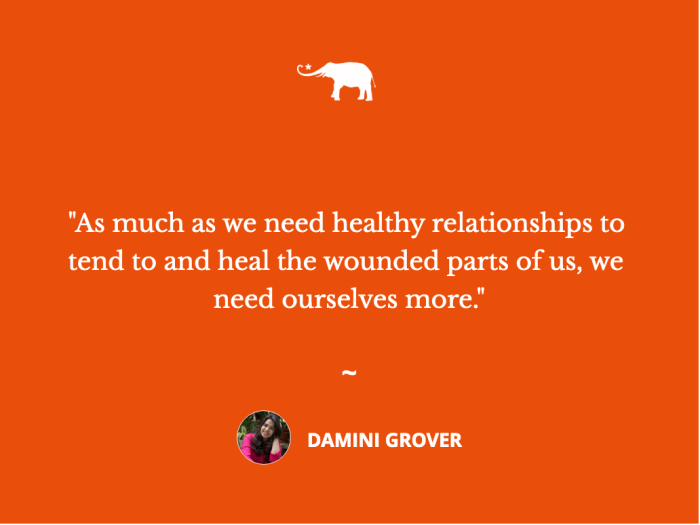View this post on Instagram
“If you never heal from what cut you, you’ll bleed on people who never cut you.” ~ Anonymous
In an adult relationship, there are usually four people in a relationship with each other: two adults and the inner child each carry within.
The quality of the relationship that the individuals share with each other is immensely impacted by the extent to which they have been able to hold, nurture, and heal their inner child within because most of the havoc in relationships is caused by those innocent, hurt, unseen, unacknowledged parts of us that, overtime, begin to throw tantrums in ways that the adult self fails to fathom.
When the inner child who has always longed to be seen, heard, and felt begins to scream, shout, yell, and cry in ways that don’t fit the adult world situations, relationships begin to breakdown.
And that’s why no matter what we may have gone through as kids, our healing and return to wholeness is our responsibility as adults.
I am often asked and I have wondered about this myself:
“Why do people have kids if they can’t take care of them and give them the love they deserve?”
“What was my fault as a child?”
“Why did I have to go through all of this neglect, avoidance, pain, and anguish?”
The answer seems logical—flawed, yet real at the same time.
The fact is we are all victims of victims. We go through our own cycles of pain and misery, and only a few of us have the courage to face our pain and work through it.
When we internalize our trauma as “normal” or “a way of life,” it turns into conditioning, which, then, is easily passed down to the newer lot. What they learn becomes their reality until one day, one or more of them decides to challenge, question, and move out of that faulty conditioning.
The fact also is that we, as humans, follow conditioning blindly. We do things because we have to or because we are made to believe that following social norms and keeping people happy is the only way to be a worthy member of society.
We are taught that the world’s happiness is more important than our own. Therefore, over a period of time, we allow these rubbish ideas to suck the love out of us, turning us into resentful human beings with our wounded inner children, wreaking havoc into spaces that don’t even deserve it.
Along with all this, there is another important fact of life that we often fail to consider: at the end of the day, it’s our life’s journey. We are also born in certain circumstances so that we can learn the lessons we need to learn in this lifetime—self-love being the prime lesson.
And when we enter relationships from a space of pain, anguish, lack, and agony, we cause more damage for ourselves than we realise.
As much as we need healthy relationships to tend to and heal the wounded parts of us, we need ourselves more.
We need to know what hurts and why. We need to know what would help us to heal. And then we need to be able to see people for who they are so that we can choose the ones who can be a part of our healing journey.
This evaluation cannot come until—and unless—we are aware of how our own trauma has impacted us because if we don’t, we become like a ticking time bomb: ready to explode any minute, at anything.
“Trauma isn’t what happened to you. It’s what happened inside of you.” ~ Gabor Mate
All relationships are built on needs—emotional, physical, psychological, and spiritual—and we begin to learn about them right from the time we are born.
If our needs are met, we grow up to be secure beings who are in touch with their wants, can communicate their needs, and can regulate their emotions as well.
But when they aren’t met, we grow up to be insecure, anxious, codependent, or avoidant human beings who are disconnected from their needs, cannot communicate their wants effectively, and fail to regulate themselves.
This often shows up in adult relationships as:
1. Attachment issues—where individuals are either too insecure, anxious, and need the constant presence and reassurance of their significant other to feel safe and regulated, or avoidant where they prefer to stay disconnected from their emotions and find the demands of a relationship overwhelming. Both styles rest at the opposite ends of a spectrum.
2. Communication issues—where in order to get our needs met, we blame, criticize, lash out or block, stonewall and refuse to let the other person in. And these are nothing more and nothing less than the inner wounded child screaming for that love, care, nurturance, and attention that it has always yearned for and never got. They also highlight our inability to truly, openly, and simply ask for what we want because we never learnt to do so.
3. Emotional dysregulation. A child doesn’t know how to soothe himself/himself and needs the caregiver to do so. When that doesn’t take place, the child grows up feeling unsafe, insecure, anxious, fearful, and these big emotions are way too much for a child to regulate on his/her own.
While survival may demand that somehow this helpless, clueless being must find his way around this lack of safety, it seeps into its very being and makes it extremely hard for the adult version to regulate himself/herself. And that’s why whenever we find ourselves in threatening or emotionally overwhelming situations, the unhealed parts of us begin to surface.
And all of these once again start a vicious cycle wherein in order to get our needs met, we regress into childlike patterns of asking, demanding, or being passive aggressive. This, instead of letting our partners come closer to us, pushes them further away.
And when they retreat, we are once again left with our “big” emotions.
“Your inner child holds the power of reality in its hands. Do you want an angry, hurt child holding that power or a happy one?” ~ Angie Johnsey
For the child within, it is extremely difficult to grasp that it still has to fulfill its needs on its own despite being in this mature adult world.
But most importantly, it’s for us, adults, to realise that we are no longer kids and that healing those wounded parts is our responsibility.
When two adults enter a relationship, they are looking for a relationship that makes sense in their adult world. The child within is a source of joy, laughter, freedom, fun, innocence, and love, and for that to happen, we need to first nurture that child within.
Only when we learn to hold these parts of us with tenderness and love, will we be able to allow someone else to do the same.
“The wounded child in you needs you..your suffering needs you to acknowledge it.” ~ Thich Nhat Hanh
~









Read 37 comments and reply